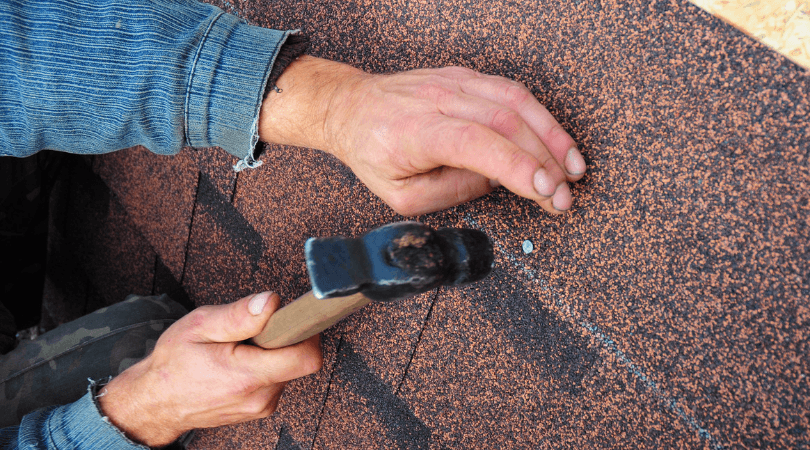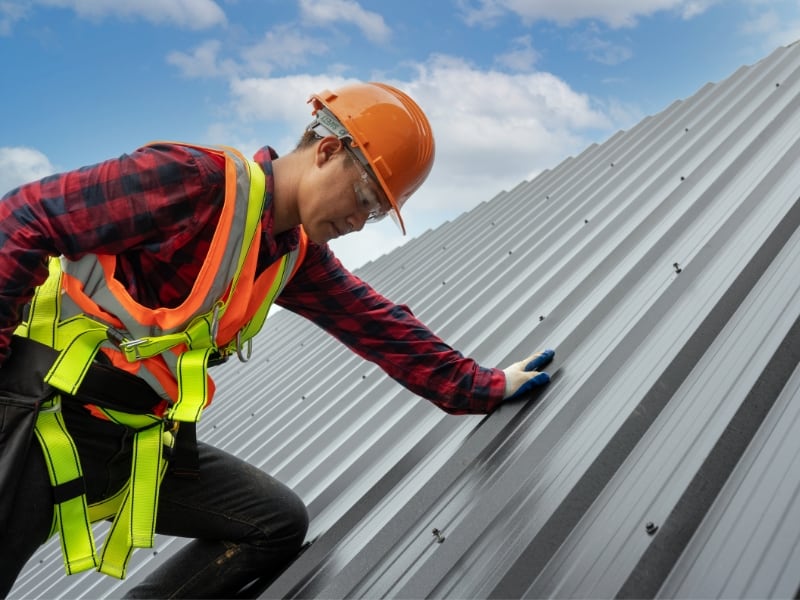
As a homeowner, no one expects you to be an expert on all roofing products and services. However, misunderstanding roofing projects can cause detriment and damage to your home. Unfortunately, most homeowners tend to underestimate the level of care that a roof requires and have misguided expectations about the support of their home’s roof. Addressing these roofing myths will allow you to gain information for your decisions about your home’s care, maintenance, and health.
6 common roofing myths
-
-
Tarping always protects my yard during roof construction.
Roofing is a messy job. While many local roofing companies take great care to limit debris from getting into your landscaping, blowing winds and little pieces cause even the most cautious roofers sometimes to miss parts of broken shingles. One of the biggest concerns from homeowners during roof replacements is protecting shrubbery and plants, with a standard preventative measure being placing tarps over your shrubbery, plants, and other landscaping.
However, tarping is not always the best solution. If your roofing repairs last more than a day, your plants will begin to be suffocated and weighed down by the weight and concealment of the tarps. All plants need sun and air to survive, and blocking them with tarps can harm more than protect them. Instead, find a local roofing company like Ridgeline Construction that has tools such as a rolling magnet and wand magnet to go through your property at the end of each workday, collecting any loose materials that may have fallen from the roof during the day.
-
My warranty covers anything that could go wrong on my roof.
It’s common for homeowners to believe the mistaken impression that baseline material warranties cover any necessary roof repairs. In actuality, most of these warranties only cover manufacturer defects in the materials, not things such as severe weather and lack of maintenance. Not to mention, “lifetime warranties” may be as short as two years, or as long as a lifetime. When it comes to an understanding of the truth of your warranty and its coverage, ask your trusted local roofing company to explain what the warranty options are.
-
All asphalt shingles are the same.
Principally, similar materials create many asphalt shingles. However, asphalt shingles come in a wide variety of textures, colors, and brands. Moreover, the warranties that accompany different asphalt shingles vary. Homeowners can tend to believe that all asphalt shingles look the same. When in reality, the aesthetics and configurations of shingles differ. Architectural shingles are thicker than conventional three-tab shingles and are available in different colors and textures, like wood or slate.
-
Metal roofs will make my home warmer.
While it is true that a metal roof can get very hot under the sun, this material is one of the cooling options available today. Combining a metal roof with a well-insulated attic can make your home more comfortable and save cooling costs during the summer months.
Local roofing companies recommend metal roofing because of its ability to reflect and shed off heat faster than any other roofing material, making it an energy-efficient option.
-
I can re-roof over my old shingles to save money.
Just because homeowners have done this in the past does not make it the right choice for your home. While a roofer can use this technique if you only have one layer of shingles on your roof, it is not a wise option. While homeowners are attracted to doing this because of the perception of saving money, most of the time, this option will cost you money in the long term. If your home has more than two layers of shingles on your home, it can be a labor-intensive process to remove. Additionally, if your current roof isn’t in pristine condition, then adding a layer of shingles can expedite roofing problems like leaking, curling, or the underlying sheathing and structure of your roof.
-
I only need roof inspections when I can see that something is wrong with my roof.
When it comes to checking the health of your roof, most homeowners start with what they can see: leaks, mold, damaged or missing shingles, and age. However, the outside of your roof can hide damage to the underlayment or insulation layers. Additionally, checking your attic may not reveal the actual problem area that’s causing a leak.
Instead, preventatively having an annual roof inspection by a premier local roofing company can protect your home and save you thousands of dollars in the long run. Catching problems early, rather than after it has affected the comfort of your home, is preferred for most homeowners.
-
What is The Longest Life of a Roof?
When it comes to the lifespan of a roof, many factors can impact how long it will last. From the type of roofing material to the quality of the installation, the longevity of your roof will be influenced by a variety of factors.
Roofing Material
The type of roofing material you choose will have a significant impact on the life of your roof. Some materials, such as metal and slate, are known for their longevity and can last up to 100 years or more. Others, like asphalt shingles, typically have a shorter lifespan of 20-30 years. When choosing a roofing material, it’s essential to consider the climate and weather conditions in your area and your budget and design preferences.
Quality of Installation
The quality of the installation is another critical factor that can impact the life of your roof. Poorly installed roofs are more prone to leaks and other problems that can shorten the lifespan of your roof. Make sure to hire a professional roofing contractor with a proven track record of quality work to ensure that your roof is installed correctly and will last as long as possible.
Roof Maintenance
Regular roof maintenance is essential for ensuring that your roof lasts as long as possible. This includes cleaning your gutters, checking for damage, and having your roof inspected at least once a year. By taking care of your roof, you can identify and address potential problems before they become more significant issues that can shorten the life of your roof.

Climate and Weather Conditions
The climate and weather conditions in your area can also impact the life of your roof. In areas with harsh weather, such as heavy snow and strong winds, roofs will typically have a shorter lifespan. In milder climates, roofs can last longer. Consider the environment in your area when choosing a roofing material and make sure to take steps to protect your roof from damage due to weather.
In conclusion, the most extended life of a roof will be influenced by a variety of factors, including the type of roofing material, the quality of the installation, roof maintenance, and the climate and weather conditions in your area. By understanding these factors and taking steps to protect your roof, you can ensure that your roof lasts as long as possible and continues to protect your home for years to come.
Busting Beliefs about Different Types of Roofs and Their Durability
There is a common misconception that metal roofs are more durable and longer lasting than other types of roofing materials, such as asphalt shingles. While it is true that metal roofs may be slightly more durable in certain climates, all quality roofing products can last a lifetime if properly installed and maintained. Asphalt shingle roofs have been known to last up to 30 years or even longer when properly maintained. Clay tile roofs are extremely long-lasting and can last for up to 50 years with proper maintenance. Slate, cedar shake, and synthetic slate all have their own unique lifespans, but each type of material has its own pros and cons when compared to others that should be taken into consideration before making your final decision.
No matter what type of roof you choose, it is always essential to keep up with routine maintenance and inspections. Proper upkeep can help extend the life of your roof and save you money in the long run. Regularly checking for any signs of wear or damage can prevent minor issues from becoming more extensive, more expensive problems down the road. A qualified roofing contractor can provide an honest assessment of your current roof’s condition, as well as suggest solutions to any potential issues they may find before they become too costly to repair or replace.
At the end of the day, all types of roofs have their own unique benefits and drawbacks that should be taken into account when making a decision about which top will best suit your home’s needs.
Finding a local roofing company
What ultimately helps homeowners debunk the myths surrounding roofing products and services is having a local roofer that they trust will share valuable, informative information during their roofing construction process.
At Ridgeline Construction, we value you as a homeowner. As a family-owned company, we understand that your home is one of your most important financial assets and that it protects your most valuable personal asset: your family. We have customer satisfaction and impressive credentials to back up the claims that Ridgeline Construction is the premier roofing company in this area. If you have more questions about myths and misconceptions about roofing or exteriors, give us a call.
Need more information? Contact our team today!
Ridgeline Construction Roofing & Exteriors is one of the best home improvement specialists in the area. We won’t sacrifice quantity for quality, and we’ll always strive to provide you with the highest level of service. Schedule a free estimate and consultation today by calling us at (256) 325-1345 or by filling out our online form.


